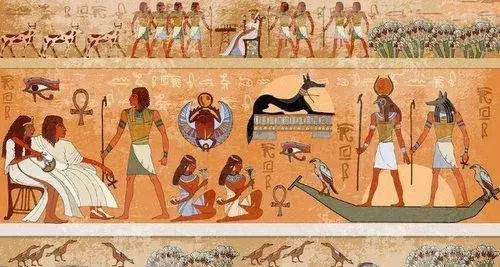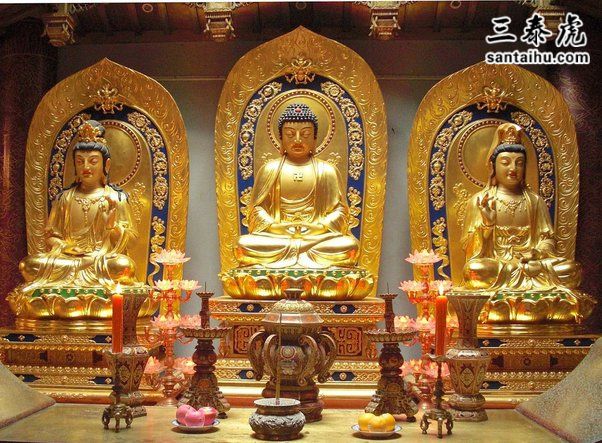Has India ever influenced China?
印度对中国有过影响吗?

Quora评论翻译:
Profile photo for inghe Li
inghe Li, Lived in China for 20 years
Yes, and a very profound influence, so much so that modern Chinese no longer notice that part of their culture is Indian-rooted. An analogy would be Judeo-Christian influence on Western culture.
是的,影响非常深远,以至于现代的中国人没发现他们的部分文化是源于印度的。一个类比就是犹太教和基督教对西方文化的影响。
To give you an example, there is a word for ‘moment’ in Chinese which is 刹那 (pronounced as chà nà). Sounds familiar? Yes, it’s a loanword from Sanskrit ‘ksana’, which means a short period of time. Modern Chinese use this word so often that it doesn’t appear to us at all it’s a Sanskrit loan.
举个例子,中文中有一个表示“瞬间”的词-“刹那”,听起来熟悉吗?是的,这是从梵文“ksana”演变的外来词,意思是瞬间。现代中国人经常使用这个词,他们根本不觉得这是梵语借词。
Traditional Chinese thought system has three pillars: Confucianism-Legalism, Taoism and Buddhism. The three schools debated and interacted with each other, producing all the main currents in traditional Chinese thought. Taoism and Buddhism somehow intertwined with each other to some extend and often acted as a counter-balance to this-worldly focused Confucianism-Legalism.
中国传统思想体系有三大支柱:儒法、道教和佛教。这三个学派相互争论、相互影响,形成了中国传统思想的全部主流。道教和佛教在某种程度上相互交织在一起,平衡以世俗为中心的儒家-法家主义。
Even though Buddhism is not the dominant religion in China now as most people are not religious, Buddhist thought permeates Chinese art and literature. If someone in a traditional Chinese society was fed up with secular affairs, he would usually turn to Buddhism for aspiration. Zen Buddhism is an amalgamation of Buddhist and Taoist thoughts. Buddhists produced many of the finest pieces of Chinese literature and art.
虽然佛教在中国不是占统治地位的宗教,因为大多数人都不信教,但佛教思想渗透在中国的艺术和文学中。在中国的传统社会中,如果有人厌倦了世俗事务,他通常会向佛教求教。禅宗是佛教和道教思想的融合。佛教创作了许多中国文学和艺术的精品。
Sanskrit also had a profound influence in Chinese linguistics. By comparing Chinese and Sanskrit, Chinese scholars in the 5th century discovered for the first time that Chinese was in fact a tonal language and published a tonal dictionary of Chinese. Studies in Sanskrit inspired Chinese scholars in the 5th century to do a systematic study of Chinese phonology and preserved for us how Chinese was pronounced back then.
梵语也对中国语言学产生了深远的影响。五世纪的中国学者通过比较汉语和梵语,首次发现汉语实际上是一种声调语言,并出版了汉语声调词典。梵文研究启发了5世纪的中国学者对汉语音韵学进行系统研究,并保存了当时汉语的发音。
Without Indian cultural influence, medieval/early modern Chinese philosophy, literature and art would not have become what they were. On a societal level, Indian philosophy also had profound influences: such as the concept of karma influenced Chinese charity practices as well as Chinese ethics. Re-incarnation (also a concept from India), though never made its way to Confucian-Legalist High culture, permeated Chinese folk lores and folk spiritual beliefs, and leaves its traces in many modern Chinese idioms, even though it’s no longer widely believed, as most Chinese are now atheist. Many of these influences are not perceived by modern Chinese as Indian-rooted, since they’ve become so used to them that their ‘foreign’ origin is no longer felt.
没有印度文化的影响,中世纪/早期现代中国的哲学、文学和艺术不会成为今天的样子。
在社会层面上,印度哲学也产生了深远的影响:比如因果报应的概念影响了中国的慈善和伦理道德。
转世(也是一个来自印度的概念),虽然从未进入儒家法家的高雅文化,但渗透在中国民间传说和民间精神信仰中,并在许多现代汉语成语中留下了痕迹,尽管它不再被广泛相信,因为大多数中国人现在都是无神论者。
现代中国人并不认为这些影响源自印度,他们已经习惯了这些影响,不再觉得他们源于“外国”。
On the other hand, Chinese influence on India is largely technological and secondary. One important aspect though, is that Chinese historical writings are very useful to reconstruct India’s pre-Islamic history. The writings of Buddhist monks who travelled to India give the most detailed (if not objective) description of India in Late Antiquity and the Early Middle Ages, as Indian historical writings before Islam were scarce.
另一方面,中国对印度的影响在很大程度上是技术上的,也是次要的。
然而,一个重要的方面是,中国的历史著作对重现印度前伊 斯兰历史非常有用。
前往印度的佛教僧侣的著作,对印度在古代晚期和中世纪早期的情况进行了最详细的描述,
之前,印度的历史著作很少。
Andrew Dang, HSE Officer (2012-present)
From a Vietnamese perspectives, I would say in terms of cultural interactions, especially the concepts of Buddhism, India truly had her strong influences on the flows Chinese culture throughout different periods of history.
从越南人的角度来看,我认为在文化互动方面,在不同的历史时期,印度确实对中国文化产生了很大的影响,特别是佛教的概念。
The Chinese idiom “恒河沙数“ (Vietnamese: “Hằng Hà sa số”) undoubtedly has its origins from India. Literally, “恒河沙数“ means “countless like the sand of the Ganges”, in which Ganges is a sacred river in India.
中国的成语“恒河沙数”无疑起源于印度。从字面上看,意思是“无数的,就像恒河里的沙子”,恒河是印度的一条圣河。

Historically, this idiom directly came from the Shorter Sukhāvatīvyūha Sūtra or “佛說阿彌陀經” (“Phật thuyết A-Di-Đà Kinh”), in which Siddhārtha Gautama used it to describe the countless numbers of Buddhas in the Buddhist cosmology.
历史上,这个成语直接来自于“佛說阿彌陀經”,其中乔达摩用它来描述佛教宇宙论中无数的佛。

On the other hand, the Chinese words “西方極樂”(Vietnamese: “Tây phương cực lạc”) also comes from the concept of Sukhāvatī or the Western Pure Land/ Western Paradise in Buddhism. According to Buddhism, the Western Pure Land is the living place of the Amitabha Buddha.
汉语“西方極樂”也来自于Sukhāvatī的概念,即佛教中的西方净土/西方天堂。根据佛教的说法,西方净土是陀佛居住的地方。
Finally, the Chinese words“涅槃” (Vietnamese: “Niết bàn”) mean for concept of Nirvāṇa. In fact, it is an Indian religious concept of both Buddhism, Hinduism, Jainism and Sikhism, which means the state of perfect quietude where people are liberated from the cycles of life and death.
汉语“涅槃”表示Nirvāṇa的概念。实际上,它是印度佛教、印度教、耆那教和锡克教的一种宗教概念,意思是人们从生死轮回中解脱出来的完美平静状态。
Nitish Sharma, I Know Past, Present & Future of INDIAN POLITICS.
Here's an amazing quote by Hu Shih :
“India Conquered and dominated China culturally for 20 centuries without ever having to send a single soldier across her border.”
胡适曾说过这样一句话:
“印度不费一兵一卒就在文化上征服并统治了中国2000年。”
Xane Feng, I am Chinese
Yes, of course. Buddhism had a huge influence on China, and it came from India. The Shaolin Temple was founded by an Indian monk.
However, anybody who thinks Chinese statecraft and philosophy (other than Buddhism) originated from India is living in fantasy land.
On another note, the answer wiki is incorrect: Sun Wukong is NOT Hanuman. Though the two share similiarities, there is no evidence that the legend of Sun Wukong came from India. On the contrary, Wukong’s origins are well documented, and come from Chinese folklore.
是的,当然有影响。佛教传入印度,对中国产生了巨大的影响。少林寺是由一位印度和尚建立的。然而,任何认为中国的治国方略和哲学(除了佛教)起源于印度的人都是生活在幻想世界里。另一方面,维基的答案是错误的,孙悟空不是哈奴曼。虽然两者有相似之处,但没有证据表明孙悟空的传说来自印度。相反,悟空的起源有文献记载,来自中国民间传说。
Nilesh Thingalaya
Indian Influence on China
Chinese medicine was derived from Ayurveda.
Martial arts originated in India.
Yin Yang comes from Ida ingala .
Indian Mathematics ( of course the whole world uses Indian numerical system) .
印度对中国的影响
中医源于阿育吠陀。
武术起源于印度。
阴阳源于印度的三脉。
印度数学(全世界都用印度的数制)。
Aniruddhbhai Dhadhal
both countries were having a good relation in history.
India conquered and dominated China culturally for 20 centuries without ever having to send a single soldier across her border.
两国在历史上关系良好。
Liang iao
Buddhism has a profound influence on China.
Buddhism was the first to change Chinese mythology.
Most of the legends about the afterlife come from Buddhism.
The most classic novels in ancient China, "the journey to the west", "a dream of Red Mansions", is also based on Buddhism.
佛教对中国有着深远的影响。
最早改变中国神话的是佛教。
关于来世的传说大多来自佛教。
中国古代最经典的小说《西游记》、《红楼梦》也是基于佛教。
译者:Jessica.Wu
此文由 三泰虎 编辑,未经允许不得转载!:首页 > 印度看中国 » Quora:印度对中国有过影响吗
 印媒:在中国文化中,没有传统立春的农历年是寡妇年,一些中国人对此持谨慎态度
印媒:在中国文化中,没有传统立春的农历年是寡妇年,一些中国人对此持谨慎态度